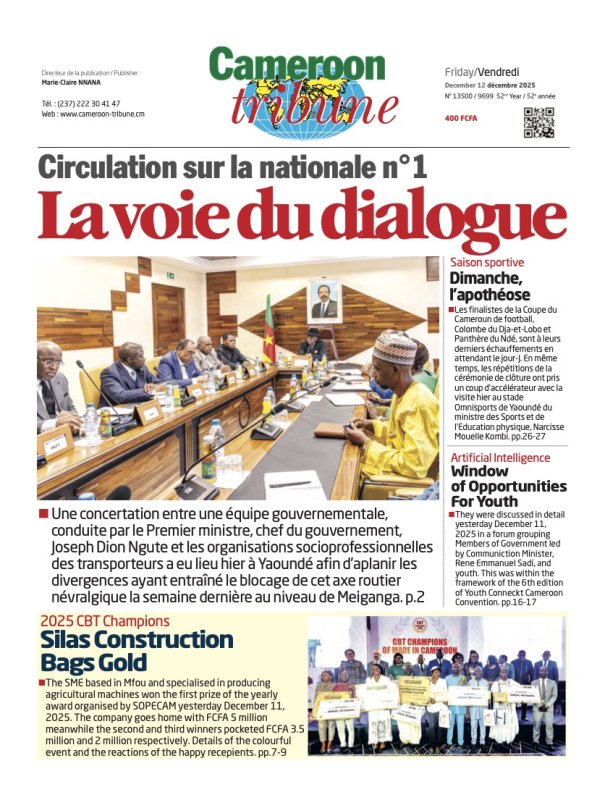Blood Donation: Clear Existing Obstacles
- Par Eldickson Agbortogo
- 21 Jul 2022 11:16
- 0 Likes
Blood donation is a life-saving exercise that is important to all, but not well-known by many. It is only when situations occur that people tend to see the importance of blood donation. At times during circumstances where people need blood, it is generally too late to tackle the consequences of its absence in hospitals. For obvious reasons, the need for blood donation spans beyond the Cameroonian borders. It is a planetary problem that different generations and governments have been struggling to fine-tune adequate strategies to overcome. In so far as experts in this domain are brainstorming on the issue day-in-day-out, so too is the public who are the main beneficiaries eager to know what has been done, what is being done and what is to be done. An urgent clarification of the public by providing adequate answers to these questions might not only save lives, but also help in stepping up the different campaigns to woo donors.
In Cameroon, it is an open secret that there is acute blood deficit in all the 541 blood banks spread all over the ten regions. Medical sources say, even though about 990,000 pints of blood were collected in 2020, the situation is alarming as only 140,207 pints of blood were collected in 2021 and nearly half so far in 2022. To curb the deficit, local experts hold that Cameroon needs at least 270,000 pints of blood yearly in the different blood banks in the country. But how can we overcome this deficit in a country where blood donation is still very slow and deep-rooted cultural barriers a major obstacle. Not everyone sees the need to voluntarily donate blood. Most people only get compelled when a family or friend is in dire need of blood. This explains why there are two categories of blood donors; family replacement donors and voluntary non- remunerated blood donors.
The family replacement donors constitute more than 90% of blood donors. That is those who show up when their family members or friends need blood. When they do make the donation, they are never seen within the vicinity even if they are solicited by medical authorities. The second category of blood donors is the voluntary non remunerated blood donors. This is a small fraction of persons who have heeded to the call for voluntary blood donation. But experts say the percentage of people in this category is quite insignificant compared to the very high demand from the population.
To close the gap, the World Health Organization requires that Cameroon collects blood from 1% of the population, representing 270,000 pints per year. This cannot be done without overcoming some of the already known challenges that are peculiar to Cameroon. The fact that most blood banks are still integral parts of hospitals or laboratories with no funds directly allocated to them makes it difficult to have a mastery of what is entering and going out. Infrastructural issues and logistics are another major concern because there are no appropriate structures and logistics for blood banks in many settings. Hence, trained blood transfusion services are also lacking. The few available suffer from frequent power cuts which make conservation difficult given the absence of backup generators and solar panels. In addition to these hurdles are the cultural, tribal and corrupt practices that have also marred the policy.
The National Blood Transfusion Unit was created to ensure the availability and accessibility of safe blood and blood products throughout the national territory with central, regional and district hospitals across the country as centres for blood donations, but some of these centres are said to have become business arenas for blood trafficking by some medical officials. Apart from refusing to donate blood because their culture, tradition and religion does not permit them, others do merchandise donated blood to hospitals. They have not only established networks in public and private hospitals, but have made some blood banks centres their personal affair to the extent that when they are not on duty the blood bank is closed. In some cases, blood is made available depending on who is in need. If the patient is of the same tribe or comes with a recommendation from a powerful god father, blood is easily available, if not, the patient is asked to seek for donors first even if his or her health situation is critical.
However, addressing the above hurdles is not a clear cut guarantee for a hitch-free blood donation policy in Cameroon. A major and inevitable strategy would be a change of mentality or approach. For the pas...
Cet article complet est réservé aux abonnés
Déjà abonné ? Identifiez-vous >
Accédez en illimité à Cameroon Tribune Digital à partir de 26250 FCFA
Je M'abonne1 minute suffit pour vous abonner à Cameroon Tribune Digital !
- Votre numéro spécial cameroon-tribune en version numérique
- Des encarts
- Des appels d'offres exclusives
- D'avant-première (accès 24h avant la publication)
- Des éditions consultables sur tous supports (smartphone, tablettes, PC)











Commentaires